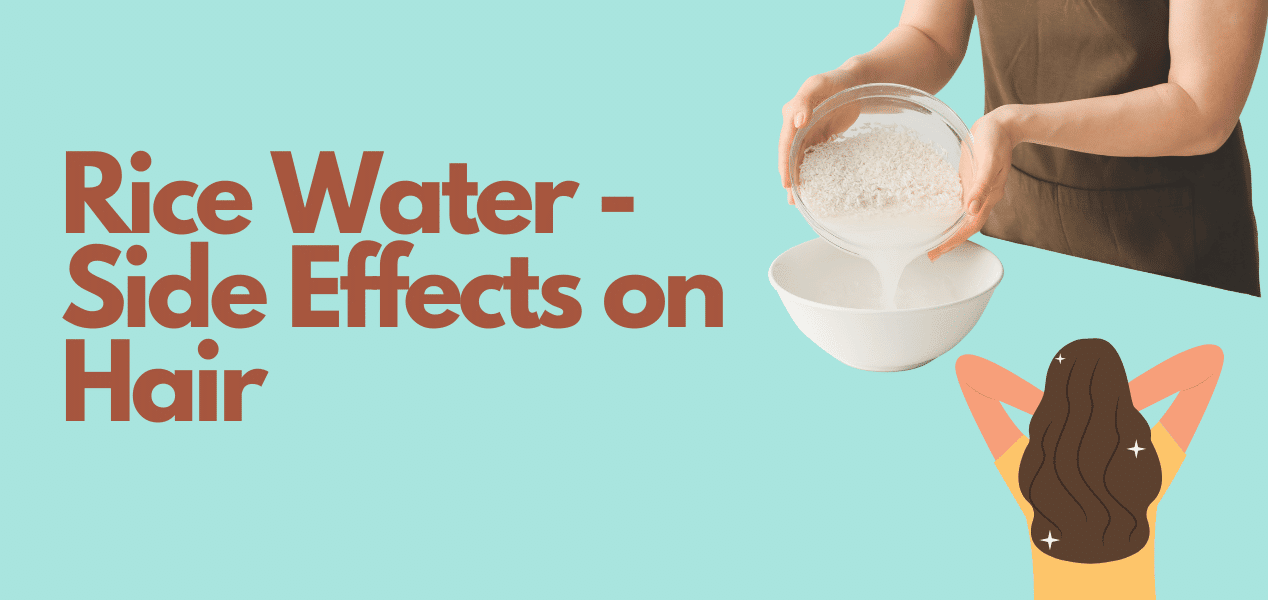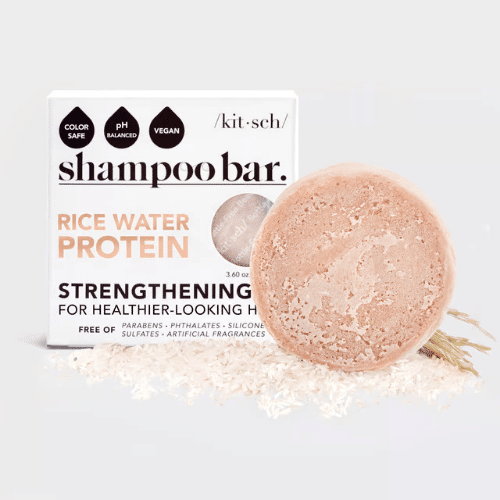
Hair products made of artificial chemicals can be tough from both financial and health perspectives. Thus, a lot of people opt for inexpensive, natural ingredients such as rice water.
But, are there any side effects of rice water on hair? Rice water, despite its benefits, can leave you with dry hair and a pungent smell.
In this article, we’ll share all the known side effects of rice water rinse. Furthermore, we’ll discuss how you can avoid these side effects so you can get the most out of this natural hair care mixture.
Rice Water Side Effects on Hair
1. May Overload Your Hair Follicles with Protein
2. Rice Water Isn’t for Dry Scalp
3. Fermented Rice Water Treatment Is A Long Process
4. Rice Water Fragrance Might Not Be for Everyone
Does A Rice Water Treatment Actually Benefit Your Hair?
In Asia, women have been using homemade rice water mixture to improve their hair condition for thousands of years. Despite the benefits of fermented starchy water, it’s only been introduced to the western world recently.
You get rice water from boiled rice. This mixture is rich in inositol, a kind of carbohydrate that can strengthen strands of your hair. Moreover, it comes with amino acids, multiple vitamins, antioxidants, and minerals.
With all these ingredients, rice water treatment offers benefits such as a higher volume of hair, strengthened, thickened, and shinier hair strands. It’s also known for detangling hair, which makes it especially useful for people with curly hair.
Experts also claim that hair treatment with rice water can help grow new hair and promote hair growth by preventing split ends.
Side Effects of Rice Water on Hair
Despite the obvious benefits, hair treatment with rice has some side effects as well. In the following sections, we’ll discuss these side effects in depth and look into ways to prevent them.
1. May Overload Your Hair Follicles with Protein
As mentioned previously, rice water contains a decent amount of protein molecules. Now, protein is definitely beneficial for your hair growth. However, protein overload can harm your hair.
This is especially true in the case of low porosity hair. High hair porosity helps absorb the protein and prevents protein buildup. Low porosity hair fails to absorb all the protein, and the protein sticks to the hair. With time, the proteins coat your hair, which becomes hard and brittle.
If you have low porosity hair, probably you’re thinking of not using rice water treatment. Rest easy, as this can be prevented easily. You just need to be thoughtful of how much you’re using the mixture. If you moderate the usage, you won’t have any protein excess on your scalp or hair.
Other than reducing the quantity, you can also limit the times you use the treatment. Instead of applying it every day, try applying it only twice or thrice a week.
2. Rice Water Fragrance Might Not Be for Everyone
Rice water benefits our hair in many ways, but it also leaves a sour smell behind. Now, a lot of people aren’t particularly fond of this smell, and we can understand why.
Now, there are different fixes to this problem. Some people leave rice water for a long time. This isn’t rational as leaving the mixture on your hair for long periods will leave your hair hard and brittle.
So, you can start by rinsing the mixture off after 10-15 minutes. If the smell is too strong for you to bear even after that, you can add a few drops of your favorite essential oil into the mixture.
Now, there’s a flaw to this plan. If the added amount is so small as to be negligible, it won’t be enough to mask the smell of fermented rice water.
On the other hand, if you end up adding too much oil, the smell will become way too overpowering. Plus, it might also affect the potency of the rice mixture.
So, it’s important to be careful in determining the number of essential oils to be added.
3. Rice Water Isn’t for Dry Scalp
Some people tend to leave rice water overnight without rinsing it off. It is mostly done from the belief that the longer you leave the mixture on your hair, the better the effects of rice water.
The truth couldn’t be any further from this. In fact, leaving the rice water for a long time can harm your hair and scalp instead. Any nutrition offered by rice water is absorbed in the first 30 minutes of application. If you leave the mixture for any longer, you’ll only expose yourself to further reactions that won’t benefit you.
Plus, it’s also seen that rice water leaves the scalp drier than usual. So, if you have a dry scalp, then you should wash rice water off as soon as possible. Also, make sure to moderate how often you use the hair treatment. This way, you’ll be able to prevent dandruff or flaky scalp.
4. Rice Water May Contain Arsenic
Recent studies have found that rice water recipes that contain rice produced in the US may create arsenic as a by-product. While there are people who don’t mind this and will apply anyway, we recommend abstaining from doing so.
In the US, most of the rice is grown in fields that used to be cotton fields. To keep the fields free of pests, a lot of insecticides were used.
Unfortunately, there are still traces of these insecticides left in these fields, and apparently, rice grains absorb these chemicals. It was also found that brown rice can absorb twice as much of these chemicals compared to white rice.
Although the level of arsenic found in these rice waters isn’t enough to harm you, you’d probably be safer not to use them.
So, instead of using rice produced in the U.S, we’d recommend using Longsheng rice. In the ancient days, the Red Yao tribe used this rice to prepare rice water mixture. Other than that, you can also use Basmati rice as they’re produced mainly in India and Pakistan.
Fermented Rice Water Treatment Is A Long Process
Now that we’ve learned about the side effects, time to look at some other issues people aren’t informed of.
Firstly, rice water isn’t a magic elixir. Unlike modern synthetic hair products, rice water doesn’t provide any instant healthy hair. If you want to get the most out of rice water medical treatment, then you must apply this frequently.
In fact, applying this irregularly may lead to the development of side effects instead of making your hair grow.
So, if you don’t think that you can commit to this treatment regularly, you better refrain from using it in the first place.
Rice Water Shampoo Bar
A rice water shampoo bar takes the benefits of rice water protein and combines it with natural ingredients to provide a strengthening, eco-friendly option for washing your hair.

Are The Benefits of Rice Water Backed Up by Research?
Not A lot of research has been conducted on the effects of rice water on hair. Most of the benefits we know of are anecdotal and don’t have empirical data to back them up.
A 2010 study of using the rinse water obtained from washing rice as a hair treatment found that “the extracts had multiple functions for hair care at the same time. Thus, the new application of Yu-Su-Ru for hair care was discovered.“
However, that doesn’t mean that rice water treatments have no benefits to offer. What it means is that we don’t know how this mixture affects dry or curly hair or any hair type in the same way or not.
So, it’s highly recommended you experiment with rice water for hair but stop using it as soon if you experience skin irritation or any discomfort.
Frequently Asked Questions
How do you make rice water?
There are different rice water recipes, but we recommend using only one tried and tested method. To make rice water with this recipe, take uncooked rice and add four times as much water to the mixture. For example, you’ll need two cups of water for a half cup of rice.
Now, heat the water following any boiling method. Once done, strain the boiling water from the rice. Now, take a glass bottle in which you can store rice water and let it sit for a few days.
The fermentation process takes about two weeks, and you’ll have rice water suitable for protein treatment after that!
Can rice water be used on color treated hair?
Yes, rice water can be used on treated hair.
However, you’ll have to apply the rice water multiple times before it actually has an effect on your hair.
Conclusion
Despite the pungent smell and other side effects of rice water on hair, using this mixture is wholly justified. Rice water can turn your damaged hair and hair roots into cleaner and healthier hair.
While we still lack scientific evidence of how it affects different hair types, it’s a tried and tested formula that benefits most users.
Instead of avoiding it, we’d encourage experimenting with rice water. With the help of the discussions, we hope you’ll be able to get better hair treatments!